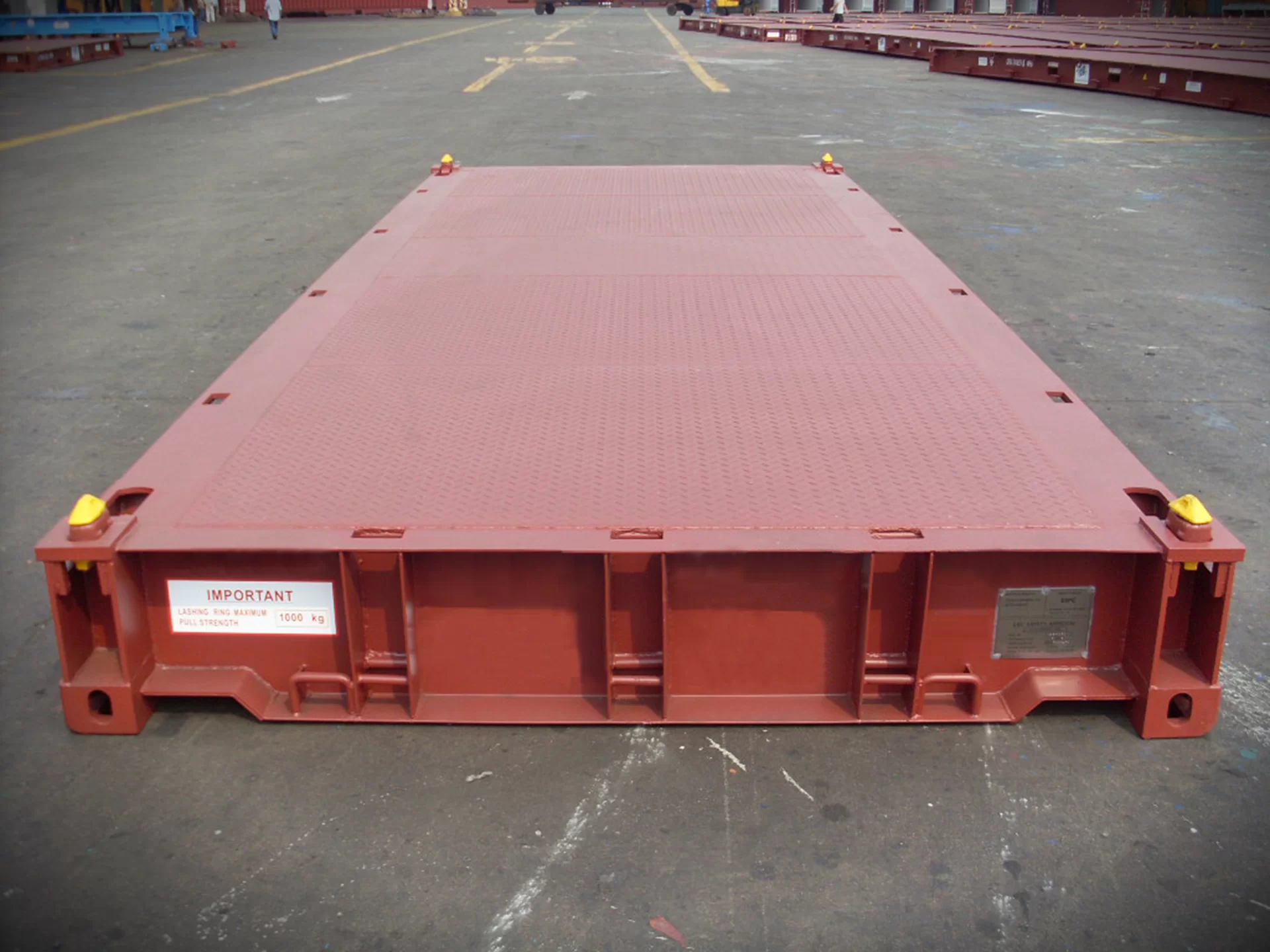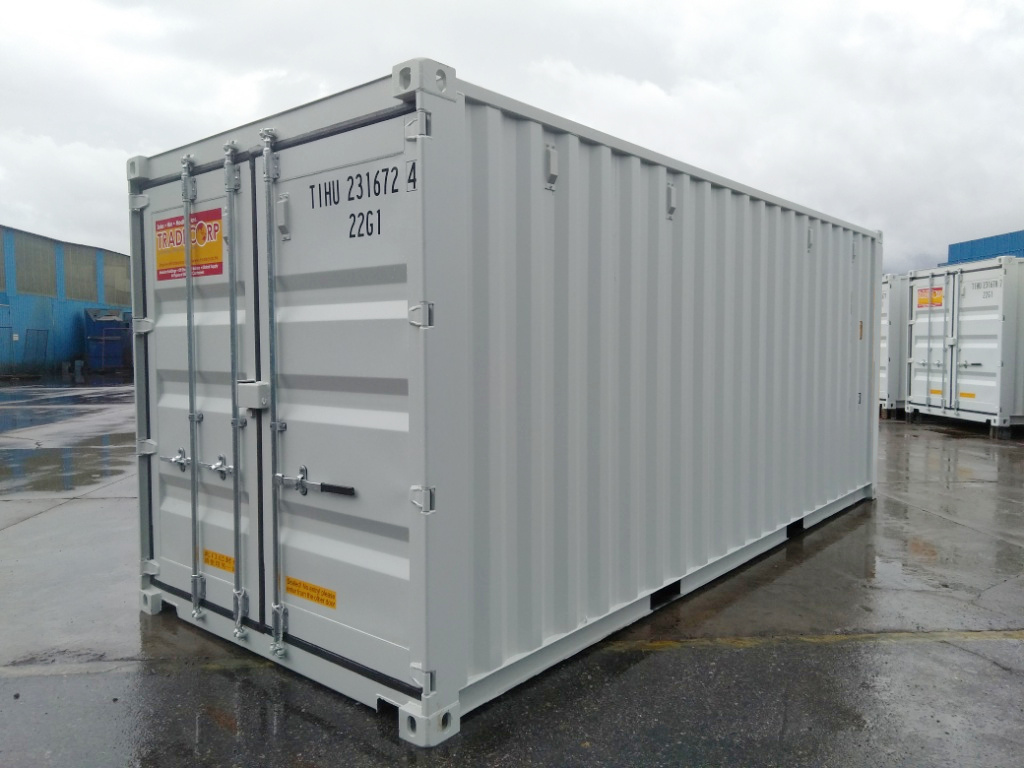Platform containers also known as flatbed differs from standard containers as they have no front, side, or top walls. This distinguishes it from flat rack containers which have front and end walls.
The platform container is ideal for accommodating irregularly shaped cargo that cannot fit into other types of containers. It is specially designed with a floor that has a remarkably high weight capacity. It allows for the adjustment of bulky and oversized cargo, such as heavy machinery, building materials, and odd-shaped cargo that cannot be accommodated in regular shipping containers.
They are available in a range of sizes and capacities to suit varying transportation needs. They can also be utilized as a base for modular constructions or as a temporary platform for stage and event setups.
Purchasing a platform container can be a significant investment, and it is crucial to understand the different types, sizes, and buying considerations before making a purchase.
This guide will provide an overview of platform containers, their uses, sizes, and purchasing tips to help you make an informed decision when investing in this type of container.
What Is a Platform Shipping Container?
A platform shipping container is a type of cargo container that is primarily used for transporting oversized or bulky goods that cannot be accommodated within the standard dimensions of a regular shipping container. It is an open-top container with no roof or walls and has a flat base with a reinforced structure to support heavy loads.
The platform container is commonly used for shipping heavy machinery, equipment, pipes, and building materials. It is also used as a base for modular constructions or as a temporary platform for stage and event setups.

What Is a Platform Container Used For?
The platform containers are particularly useful for transporting heavy machinery, large vehicles, and construction materials, such as pipes and steel coils. The open-top design allows for easy loading and unloading of cargo, and the reinforced base provides stability and durability during transportation.
Platform containers can also be used for storage purposes, particularly for oversized or heavy items that are difficult to store in traditional storage units. They are particularly useful for construction sites and industrial facilities, where large equipment and materials need to be stored securely and efficiently.
Platform containers are customizable and modifiable to meet specific transportation and storage requirements. They can be fitted with removable side and end walls to provide additional protection and security for the cargo during transportation, for instance. They can also be fitted with lashing rings and tie-downs to secure the cargo in place and prevent movement during transit.
Platform containers are a versatile and practical solution for the transportation and storage of oversized and bulky cargo. Their open-top design and reinforced base make them ideal for transporting heavy machinery, large vehicles, and construction materials, while their customizable features allow for flexibility and adaptability to meet specific transportation and storage requirements.
Platform Container Dimensions
Platform containers come in different dimensions depending on the manufacturer and the specific type. The most widely used sizes for platform containers are 20ft and 40ft. The dimensions of a 20ft platform container are roughly 6 meters (19.6ft) in length and 0.3 meters (0.98ft) in height, while a 40ft platform container is slightly more than 12 meters in length and 0.6 meters in height. Both the 20ft and 40ft containers have a width of around 2 meters. However, here are some common dimensions for platform containers:
20′ platform container
| Tare weight | Payload capacity | Internal length | Internal width |
| 2,740 kg | 31,260 kg | 6.06 m | 2.44 m |
| 6,041.7 lbs | 68,928.3 lbs | 19.9 ft | 8 ft |
*Measurement or value may vary
40′ platform container
| Tare weight | Payload capacity | Internal length | Internal width |
| 5,700 kg | 39,300 kg | 12.19 m | 2.44 m |
| 12,568.5 lbs | 86,656.5 lbs | 40 ft | 8 ft |
*Measurement or value may vary
Platform Containers: Most Common FAQs
What is a platform container?
A platform container is a type of shipping container with no sides or roof, only floor and corner posts. It is commonly used for transporting oversized or heavy cargo that cannot fit inside a standard container.
What are the dimensions of a platform container?
The most common sizes for platform containers are 20ft and 40ft. A 20-foot platform container is approximately 6 meters long and 0.3 meters tall, while a 40-foot platform container is a little over 12 meters long and 0.6 meters tall. Both sizes have a width of around 2 meters.
How is cargo secured in a platform container?
Cargo in a platform container is typically secured to the container floor using chains, ropes, or straps. If the cargo is oversized or irregularly shaped, it may need to be custom-fit and secured with special fixtures or braces.
What types of cargo are commonly transported in platform containers?
Platform containers are ideal for transporting heavy machinery, vehicles, large pipes, and other oversized or irregularly shaped cargo.
How are platform containers transported?
Platform containers are transported by sea, land, or air, depending on the destination and mode of transportation. They are typically loaded onto cargo ships, flatbed trucks, or cargo planes using cranes or other lifting equipment.
Are platform containers weatherproof?
They are weatherproof and can withstand bad weather conditions. However, It is important to properly wrap and protect cargo from moisture and other weather-related damage.
Are you considering buying platform containers?
If you’re looking to transport oversized or heavy cargo, you may want to consider purchasing platform containers. These containers have a simple design with no sides or roof, which makes them ideal for loading and unloading cargo from all sides. The most common sizes for platform containers are 20ft and 40ft, and they are typically made of sturdy steel with wooden flooring.
To secure cargo during transportation, it can be lashed to the container floor or secured with chains, ropes, or straps. Platform containers are commonly used for transporting heavy machinery, large vehicles, and other irregularly shaped cargo. If you’re in the market for platform containers, be sure to research your options and consider your specific transportation needs.
Tradecorp has a wide range of customization options for shipping containers for sale. We will help you find the perfect container solution for your business or project needs. Find a variety of types and sizes of shipping containers, from standard ones to tanks, and customizable ones. We will have them ready for you with the best deal. Fill out the contact form on our page and we will respond to your inquiry promptly

